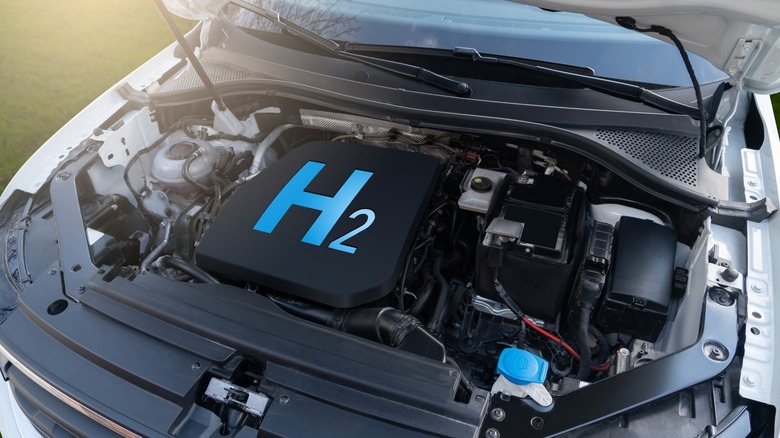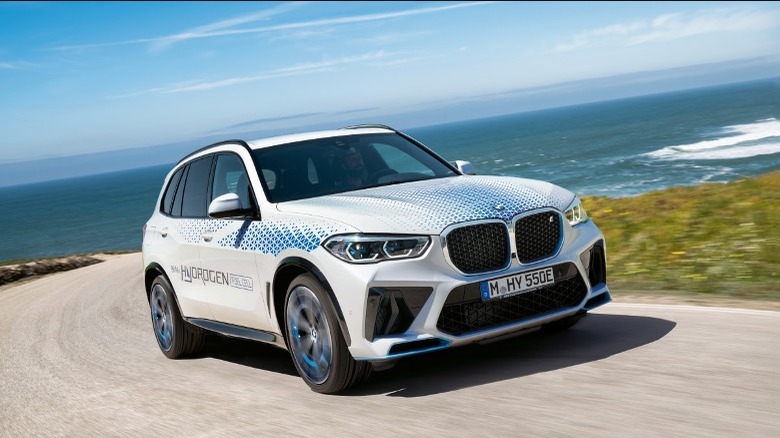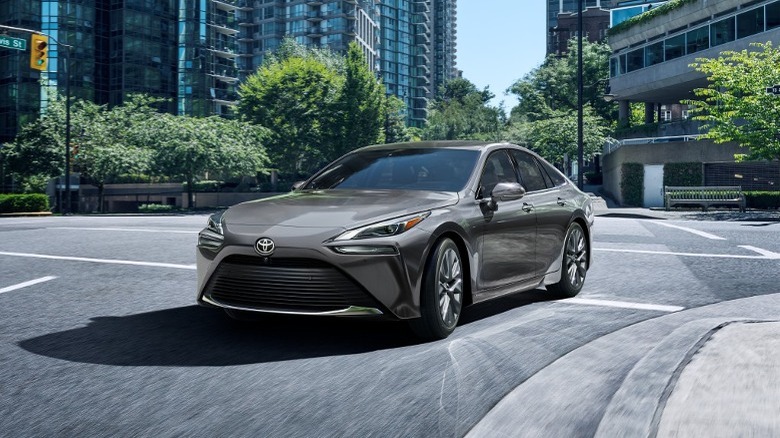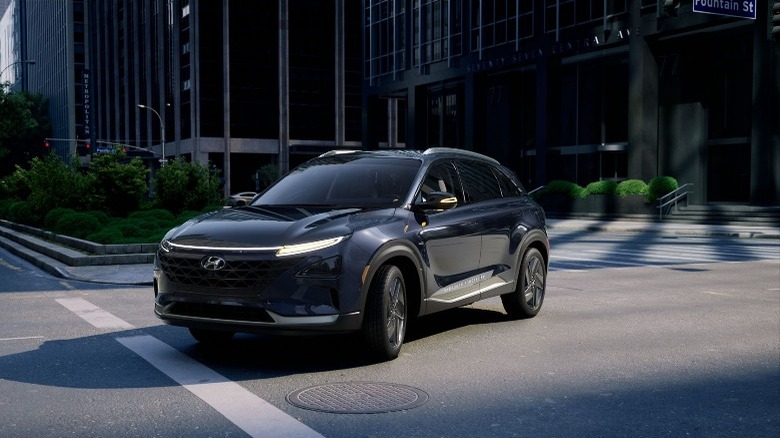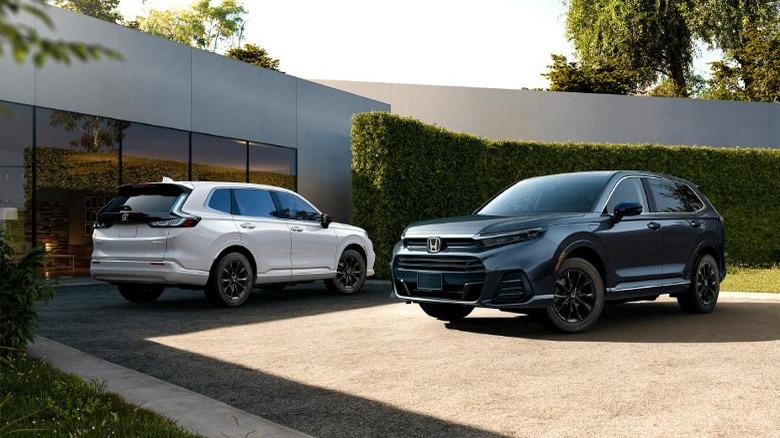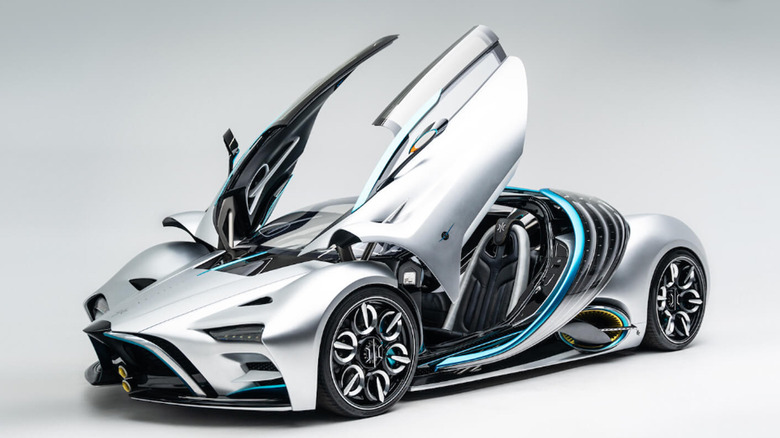5 Car Companies That Are Working On Hydrogen-Powered Vehicles
In the pursuit of attaining emission-free driving, major car manufacturers around the globe have started pushing out a greater variety of electric vehicles — and owning one has never been more accessible. Despite the challenges that EVs face, there is constant growth in the development of new technologies to promote a cleaner future.
You might have heard of hydrogen-powered vehicles that utilize a source of energy that is seemingly the perfect alternative to traditional fossil fuels to power our engines. If you're familiar with battery-powered electric vehicles, the principle of how hydrogen vehicle engines work is not a hard concept to grasp. These fuel-cell electric vehicles (FCEVs) also rely on batteries to power the motors, but they source this electrical energy using fuel cells powered by hydrogen.
This brings the goodness of driving an electric vehicle by also eliminating the long charging times since refueling the hydrogen tanks takes a couple of minutes at best. While the science and potential behind FCEVs are promising, we are still a ways away from them becoming the industry norm. Despite the challenges in engineering and development, big names in the car manufacturing space have been working to deliver a commercial-grade hydrogen-powered vehicle to the masses.
BMW iX5
Unveiled at the IAA Mobility 2021 in Munich, Germany, the BMW iX5 is the automotive company's first step into testing the waters with a hydrogen-powered electric vehicle. The car is still a concept, with around 100 BMW iX5s touring the world to determine how feasible this feat of engineering is.
The specifications of the car itself aren't anything special. The concept car has an engine capable of delivering 401 horsepower, which allows for a 0-60 mph acceleration time under 6.0 seconds. The two hydrogen fuel tanks, with a capacity of 13.2 pounds, push for a range of up to 300 miles. With a seating capacity of five people, including the driver, this hydrogen-powered SUV shares most of its design and hardware with other established cars in BMW's lineup.
BMW claims the iX5 can be refueled with gaseous hydrogen in around three to four minutes, making it a convenient option for those who have been waiting out their battery-operated EV purchase. So far, there is no set date or information about pricing for the BMW iX5 as it still roams around the globe, testing the efficiency and effectiveness of the FCEV technology.
Toyota Mirai
Literally translating to "future," the Toyota Mirai is a four-door sedan powered by hydrogen — and one you can purchase today. Unveiled a decade ago in 2014, the Toyota Mirai has matured and sees successful sales in its home country of Japan and even in the United States. The 2024 model comes in six vibrant colors and retails for around $50,000. With an approximate fueling time of five minutes, a 402-mile range for the XLE model, and a maximum output of 182 horsepower, the car is suitable for everyday use.
For new buyers, Toyota offers complimentary fuel for up to $15,000, or six years, and an eight-year warranty on major FCEV parts. The Toyota Mirai works by combining the hydrogen stored in the fuel tank and oxygen from the air when you drive the car to produce electricity. You can refill the car at hydrogen fuel pumps using the fuel card that's provided. While the trunk space is smaller, the front and rear of the cabin are spacious, and the car sports a slew of entertainment and safety-oriented features.
Hyundai Nexo Fuel Cell
Alongside the Toyota Mirai, the Hyundai Nexo Fuel Cell is the only commercially available hydrogen vehicle in the U.S., and just like the Mirai, you get a complimentary fuel card valued at $15,000 or up to six years. The stack of energy that powers this SUV comprises a 95 kW hydrogen fuel cell and a 40 kW battery. The 2024 Hyundai Nexo has an EPA-estimated range of 380 miles, which can be topped up in around five minutes at a hydrogen fuel station.
With a combined power output of 161 horsepower, the Nexo Fuel Cell is able to manage a generous 0-60 mph pick-up in 8.4 seconds, according to Car and Driver's review of the vehicle. The hydrogen-powered SUV is available in two trims, Blue and Limited — with the latter option featuring a few extra features and fittings like bigger alloy wheels and roof rails. The Hyundai Nexo Fuel Cell starts at $60,000 for the Blue trim and will run you down $63,500 for the limited version.
Honda CR-V e:FCEV
After testing a hydrogen engine in previous models, including the 2021 Clarity, Honda announced the 2025 CR-V e:FCEV that it's building in collaboration with General Motors. The Japanese automotive giant claims that prospective buyers of the upcoming CR-V e:FCEV could qualify for fuel benefits, rebates, and tax credits; however, the specifics of this are not yet clear.
With a power output of 92.2 kW through a second generation Fuel Cell Module, the Honda CR-V delivers 174 horsepower and an EPA-estimated driving range of 270 miles. The new SUV will be available in select dealerships across California for leasing later this year, although no details regarding the vehicle's pricing structure have surfaced.
The 2025 CR-V e:FCEV brings small refreshments to the exterior, sporting larger 18-inch wheels with 10 spokes, giving it an aggressive look. Gearing towards being the third hydrogen vehicle in the US, the new CR-V focuses on bringing a better infotainment experience for the users with a 10.2-inch digital instrumentation and another 9-inch touchscreen display. The car is compatible with Apple CarPlay and Android Auto and supports Qi-enabled wireless charging.
Hyperion XP-1
Boasting over 2,000 horsepower and a range of 1,016 miles, the Hyperion XP-1 is futuristic in more than just the fueling system it uses. The all-wheel drive train, paired with the insane performance numbers, makes this thing fly from 0-60 mph in just 2.25 seconds at a top speed of 221 mph. Titanium and carbon fiber are what comprise the XP-1's monocoque, making it relatively lightweight at 2,275 pounds for what it is offering.
Despite crafting an engineering marvel, Hyperion's hyper-fixation is not on the product but on the source — hydrogen. In an interview with Business Insider, CEO Angelo Kefanataris claimed that the XP-1 is simply a showcase demonstrating the possibilities of using hydrogen as an energy source. The XP-1 hypercar is "designed to function as an educational tool for the masses," said Kefanataris, further expressing his interest in developing fuel technology.
Hyperion plans to build a hydrogen fueling network dubbed the XF-7 Hyper:Fuel and has over $500 billion in planned H2 projects. The company hopes that the use of hydrogen as an energy source extends beyond just FCEVs.
